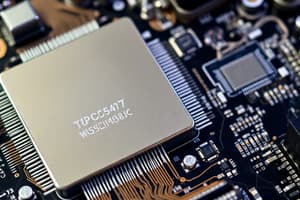Podcast
Questions and Answers
What does Moore's Law refer to?
What does Moore's Law refer to?
- Physical size of computer components
- Cost of computer repairs
- Speed of data transfer in a network
- Number of transistors inside a CPU chip (correct)
What is the stage called when the CPU performs the work described in the commands during a machine cycle?
What is the stage called when the CPU performs the work described in the commands during a machine cycle?
Execute
Computers are designed with both volatile and nonvolatile memory.
Computers are designed with both volatile and nonvolatile memory.
True (A)
How can you assess your CPU usage?
How can you assess your CPU usage?
_______ is a set of strategies for using more than one drive in a system.
_______ is a set of strategies for using more than one drive in a system.
What are GDDR5 and GDDR3 types of?
What are GDDR5 and GDDR3 types of?
What would benefit you most if you want to record your band on a computer?
What would benefit you most if you want to record your band on a computer?
What should you perform before donating your Windows computer?
What should you perform before donating your Windows computer?
What is the fastest memory in a computer?
What is the fastest memory in a computer?
Windows creates 'restore points' so that you can return your system to the way it was before you installed new software.
Windows creates 'restore points' so that you can return your system to the way it was before you installed new software.
Desktop systems are invariably a better value than lighter, more mobile computers.
Desktop systems are invariably a better value than lighter, more mobile computers.
SSD drives are preferable to conventional hard drives because they transfer data more quickly.
SSD drives are preferable to conventional hard drives because they transfer data more quickly.
In Windows, if you experience unreliable behavior, you should try a System Restore before doing a Windows Refresh.
In Windows, if you experience unreliable behavior, you should try a System Restore before doing a Windows Refresh.
There is no limit to how much RAM you can add to modern computers.
There is no limit to how much RAM you can add to modern computers.
Moore's Law describes the pace at which central processing units (CPUs) improve.
Moore's Law describes the pace at which central processing units (CPUs) improve.
Flashcards are hidden until you start studying
Study Notes
Key Concepts in Computer Architecture
-
Moore's Law: Describes the exponential growth in the number of transistors on CPU chips, indicating rapid improvements in computing power.
-
CPU Execution Stage: The stage in a machine cycle where the CPU carries out instructions is known as the Execute stage.
-
Memory Types: Computers utilize both volatile memory (temporary storage) and nonvolatile memory (permanent storage) to manage data.
System Performance and Usage
-
Monitoring CPU Usage: Check the Performance tab in the Task Manager to effectively assess CPU usage and performance.
-
RAID: Refers to a set of strategies for utilizing multiple drives in a system, enhancing data management and redundancy.
-
Fast Memory: Cache is identified as the fastest type of memory available in a computer, significantly speeding up data access.
Hardware Specifications
-
Video Memory Types: GDDR5 and GDDR3 are classifications of video memory, impacting graphics performance in computing.
-
MIDI Interface: Essential for musicians, a MIDI interface allows for the seamless recording and production of music with digital instruments.
-
SSD vs. Hard Drives: Solid State Drives (SSDs) are favored over traditional hard drives due to their superior data transfer speeds.
System Maintenance and Reliability
-
Windows Reset: Perform a Windows Reset before donating a computer to ensure personal data is removed and the system is restored to its factory settings.
-
Restore Points: Windows saves "restore points" to enable users to revert their system back to a previous state before new software installations.
-
System Restore vs. Refresh: When facing unreliable Windows behavior, conducting a System Restore is recommended prior to performing a Windows Refresh for troubleshooting.
General Considerations
-
Value of Desktop Systems: Desktop computers generally provide better value than lightweight, portable computers due to performance and upgrade potential.
-
Limitations on RAM: While modern computers can support significant amounts of RAM, there are limits to how much can be installed, contrary to common belief.
Studying That Suits You
Use AI to generate personalized quizzes and flashcards to suit your learning preferences.




